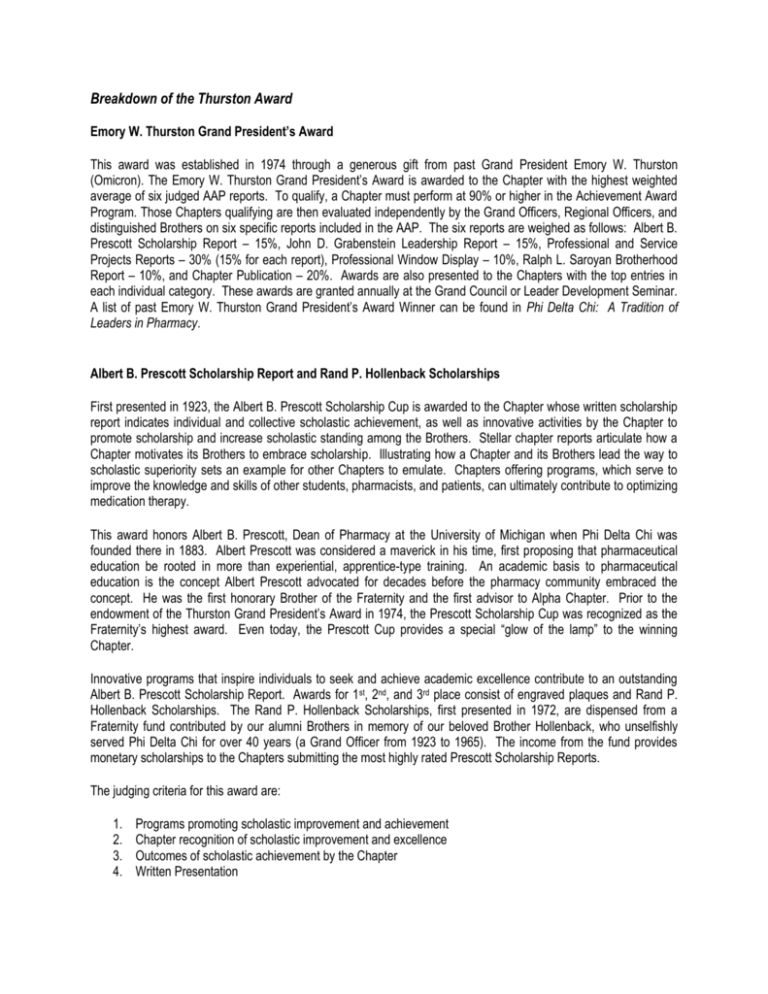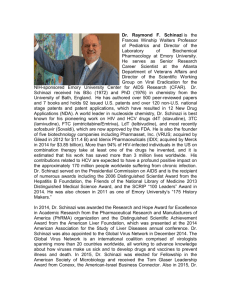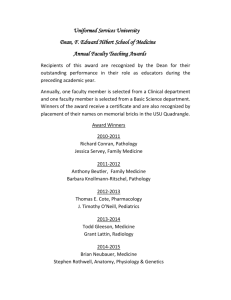Breakdown of the Thurston Award
advertisement

Breakdown of the Thurston Award Emory W. Thurston Grand President’s Award This award was established in 1974 through a generous gift from past Grand President Emory W. Thurston (Omicron). The Emory W. Thurston Grand President’s Award is awarded to the Chapter with the highest weighted average of six judged AAP reports. To qualify, a Chapter must perform at 90% or higher in the Achievement Award Program. Those Chapters qualifying are then evaluated independently by the Grand Officers, Regional Officers, and distinguished Brothers on six specific reports included in the AAP. The six reports are weighed as follows: Albert B. Prescott Scholarship Report – 15%, John D. Grabenstein Leadership Report – 15%, Professional and Service Projects Reports – 30% (15% for each report), Professional Window Display – 10%, Ralph L. Saroyan Brotherhood Report – 10%, and Chapter Publication – 20%. Awards are also presented to the Chapters with the top entries in each individual category. These awards are granted annually at the Grand Council or Leader Development Seminar. A list of past Emory W. Thurston Grand President’s Award Winner can be found in Phi Delta Chi: A Tradition of Leaders in Pharmacy. Albert B. Prescott Scholarship Report and Rand P. Hollenback Scholarships First presented in 1923, the Albert B. Prescott Scholarship Cup is awarded to the Chapter whose written scholarship report indicates individual and collective scholastic achievement, as well as innovative activities by the Chapter to promote scholarship and increase scholastic standing among the Brothers. Stellar chapter reports articulate how a Chapter motivates its Brothers to embrace scholarship. Illustrating how a Chapter and its Brothers lead the way to scholastic superiority sets an example for other Chapters to emulate. Chapters offering programs, which serve to improve the knowledge and skills of other students, pharmacists, and patients, can ultimately contribute to optimizing medication therapy. This award honors Albert B. Prescott, Dean of Pharmacy at the University of Michigan when Phi Delta Chi was founded there in 1883. Albert Prescott was considered a maverick in his time, first proposing that pharmaceutical education be rooted in more than experiential, apprentice-type training. An academic basis to pharmaceutical education is the concept Albert Prescott advocated for decades before the pharmacy community embraced the concept. He was the first honorary Brother of the Fraternity and the first advisor to Alpha Chapter. Prior to the endowment of the Thurston Grand President’s Award in 1974, the Prescott Scholarship Cup was recognized as the Fraternity’s highest award. Even today, the Prescott Cup provides a special “glow of the lamp” to the winning Chapter. Innovative programs that inspire individuals to seek and achieve academic excellence contribute to an outstanding Albert B. Prescott Scholarship Report. Awards for 1st, 2nd, and 3rd place consist of engraved plaques and Rand P. Hollenback Scholarships. The Rand P. Hollenback Scholarships, first presented in 1972, are dispensed from a Fraternity fund contributed by our alumni Brothers in memory of our beloved Brother Hollenback, who unselfishly served Phi Delta Chi for over 40 years (a Grand Officer from 1923 to 1965). The income from the fund provides monetary scholarships to the Chapters submitting the most highly rated Prescott Scholarship Reports. The judging criteria for this award are: 1. 2. 3. 4. Programs promoting scholastic improvement and achievement Chapter recognition of scholastic improvement and excellence Outcomes of scholastic achievement by the Chapter Written Presentation These reports are judged by the Grand Officers. Judges assign 25 points to each criterion category. The maximum score per Chapter is 100 points. This award accounts for 20% of the Emory W. Thurston Grand President’s Award. John D. Grabenstein Leadership Award The Leadership Award was established in 1995 and first presented at the APhA meeting in Nashville, TN (March 1996) to recognize the Chapter that best exemplified Phi Delta Chi's slogan, "Leaders in Pharmacy” SM through its written Leadership Report. This is to augment the programs Phi Delta Chi has developed in Leader Development. The report indicates individual and collective leadership development and innovative activities by Phi Delta Chi Chapters to promote leadership and improve leadership skills amongst the Brothers. Chapters also gain recognition for chapter programs that promote leader development amongst the school of pharmacy. Individual examples include Brothers who are involved in other school organizations and those who are members of Phi Lambda Sigma. The award, an engraved plaque, was named in recognition of John D. Grabenstein (Beta Gamma) in 2005. Brother Grabenstein served as a Grand Officer for 20 years, including 10 years as Grand Editor or Grand Vice President for Communications. He spearheaded pharmacy’s involvement with immunizations. The judging criteria for this award are: 1. 2. 3. 4. Programs promoting Leader Development and excellence Chapter recognition of Leader Development and excellence Outcomes of Leader Development by the Chapter Written presentation These reports are judged by the Directors of the Pharmacy Leadership and Education Institute and selected former facilitators of the Leadership Development Seminar. Judges assign 25 points to each criterion category. The maximum score per Chapter is 100 points. This award accounts for 20% of the Emory W. Thurston Grand President’s Award. Professional and Service Projects Award The crowning glory of Phi Delta Chi is to serve. Professional service is an inalienable component of the pharmacy profession. Phi Delta Chi Brothers continually seek new ways to teach, aid, and serve their fellow students, patients and members of their communities. Phi Delta Chi recognizes the professional work performed by collegiate Chapters. Accordingly, to stimulate and reward chapter service and professional activity, two professional project reports are solicited from each Chapter, one in the spring and one in the fall. Since the 48th Grand Council met in Indianapolis in 1969, Phi Delta Chi has recognized the professional work, performed by its Chapters. A trophy for the Chapter obtaining the highest combined score of these reports is awarded annually, and was first presented in 1977. Engraved plaques are presented to the second and third place Chapters. In recognition of the primacy of professional service in our profession and our Fraternity, this award accounts for 20% of the Emory W. Thurston Grand President’s Award. The judging criteria for this award are: 1. Number of Brothers participating in the projects 2. 3. 4. 5. Number of people served by the projects Number of Brother-hours spent conducting the projects Professionalism of the project (related to health care/pharmacy) Other data (money raised, people screened, size of audience) These reports are judged by the five Regional Directors for Collegiate Affairs. Judges assign 20 points to each criterion category. The maximum score per Chapter is 100 points. This award accounts for 20% of the Emory W. Thurston Grand President’s Award. Ralph L. Saroyan Brotherhood Award The Ralph L. Saroyan Brotherhood Award is presented annually to the Chapter whose concept of Brotherhood is best expressed by a member of the Chapter as well as a report detailing what activities the Chapter engages in to promote Brotherhood. The overriding questing to be answered in each Brotherhood essay is: “What does Brotherhood mean to me?” Brothers are asked to reflect on their experience interacting with collegiate and alumni Brothers locally as well as the role of the Fraternity in the lives of all Brothers. They convey the feeling of Brotherhood through writing an essay conveying a personal definition of Brotherhood based on interaction with the Brothers of their home Chapter. The winning report carries with it recognition of the individual Brothers as well as the Chapter. Engraved plaques are provided for 1st, 2nd and 3rd place Chapters. At the 62nd Grand Council in San Diego in 1999, Grand Past President Tony Mitchum announced the Executive Council’s decision to rename the award to honor Ralph Saroyan. Ralph L. Saroyan (Alpha Psi), a well-traveled Brother, mentored innumerable Brothers across the country from the 1970s to the 2000s. He served as Grand President from 1981 to 1989, and he is the inaugural chairman of the Pharmacy and Leader and Education Institute (PLEI). The Lambda Chapter at the University of Texas at Austin was the first Chapter to receive the newly renamed award. The judging criteria for this award are: 1. 2. 3. 4. 5. Sincerity Individuality Uniqueness Brotherhood Professionalism These reports are judged by Past Grand Presidents, and selected distinguished Fraternity Elders. Judges assign 20 points to each criterion category. The maximum score per Chapter is 100 points. This award accounts for 20% of the Emory W. Thurston Grand President’s Award. Chapter Publication Award and Norman H. Franke Scholarships Chapters prepare at least one publication each year to keep the Grand Officers, alumni Brothers, and other Chapters informed of activities and progress. This publication records the detailed events of the Chapter’s year and reaches out and communicates with the Chapter’s Alumni Brothers, Grand Officers, Regional Officers, and other Chapters. The publication reflects the personality and focus of the collegiate Chapter and serves to document the history of the recent year. First presented in 1974, the award includes an engraved plaque and the Norman H. Franke Scholarship (first presented in 1983). Brother Franke served as Grand Editor from 1965 until 1973; during this time he made many improvements in The Communicator. He was Grand President from 1973 until 1978, and was Grand Past President when he died in 1981. Brother Franke was much loved by Phi Delta Chi Brothers who knew him. Second and third place Chapters are presented with engraved plaques. The judging criteria for this award are: 1. 2. 3. 4. Content (Chapter activities, officer reports, Chapter history, news) Originality (Variety of material, articles, cartoons, overall theme) Format (interesting layout, quality, and design, typos, misspellings) Professionalism (appropriate material and content) **** Cost of preparation is not to be considered, because of variable Chapter resources **** 5. Interest to Alumni (alumni news, upcoming events) These reports are judged by the five Regional Directors for Alumni Affairs. Judges assign 20 points to each criterion category. The maximum score per Chapter is 100 points. This award accounts for 20% of the Emory W. Thurston Grand President’s Award.





